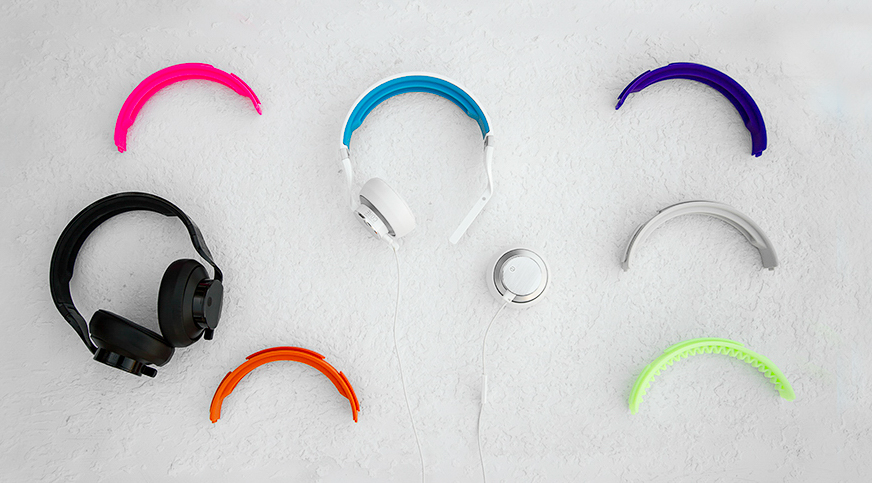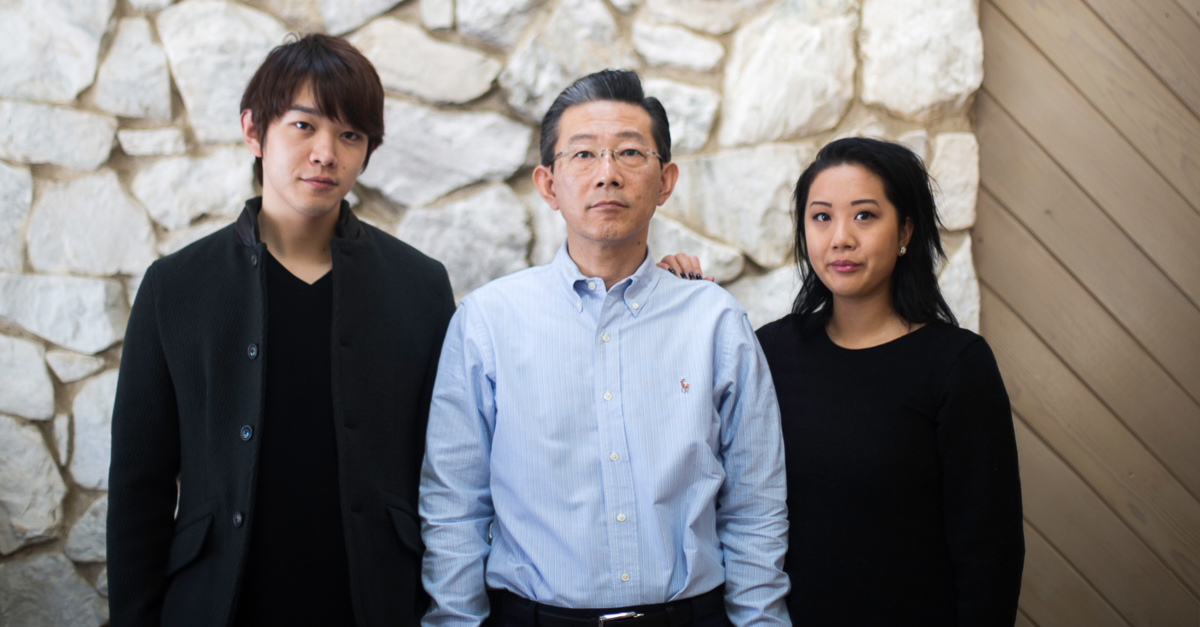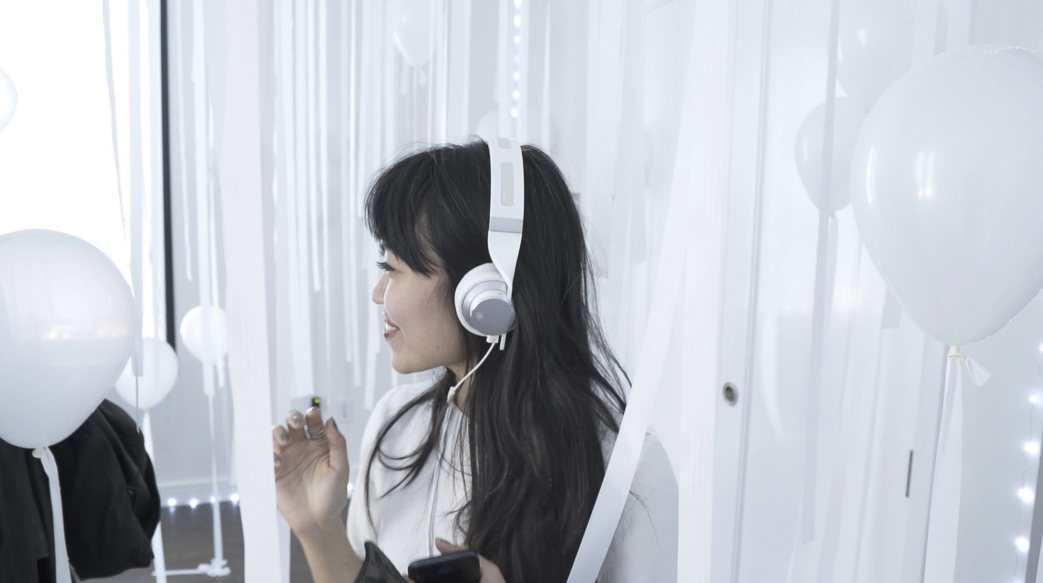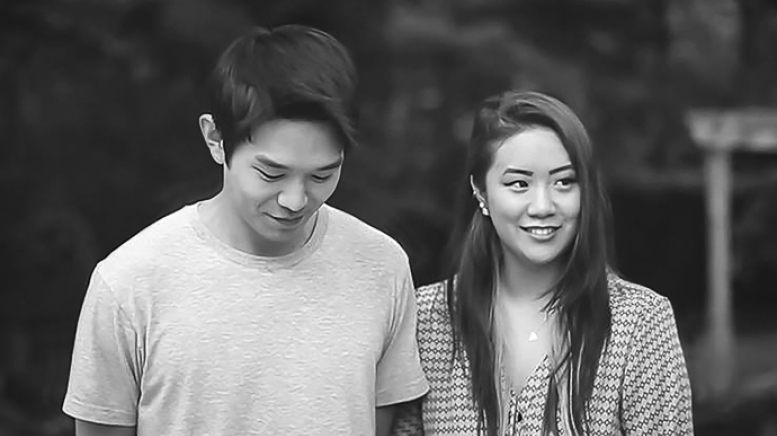What makes Axel headphones unique?
Samantha: Our headphones are completely modular, so you can easily switch between different sizes, styles—even sounds. We worked with Spotify to create a web application that matches your musical preferences to one of our soundscapes. This is the first time a headphone company has created an application like this. There are a lot of companies that have decades of audio engineering experience and offer great sound quality but are lacking in terms of design, especially for the younger generation. Then you have companies that offer great design, but lack the audio quality. Our headphones offer premium design and sound quality.
How did you create the original prototypes?
Kevin: My dad brought in some people who work in audio engineering and headphone design to our New York headquarters. At the same time, many of my musical acquaintances tried out the headphones and offered feedback. Ultimately, we came to the conclusion that everybody has a very subjective idea of what good quality sound is. Different people want to hear different things in their headphones.
Can you describe the final products and soundscapes that you’ve developed?
Kevin: We have two main product lines: an on-ear line, the ID, and an over-ear line, the FX. Within each of those two lines we created three different soundscapes, so in total we have six unique products. We created Soundscape Pure for people who don’t want any kind of affectation to their sound. It’s the most open and clean sound, good for folk, classical and jazz music. Soundscape Deep is on the opposite end of the spectrum. It’s for people who really want to feel their music and want that immediacy. It’s more of a bass-heavy sound, good for EDM, rap and dance music. Soundscape Core is the middle ground. It’s the most versatile and balanced sound.
Samantha: The beauty of having a modular headphone is that we’re able to offer people as much choice as possible. You can actually purchase extra soundscapes instead of having to buy a second set of headphones.

Who are your target customers?
Kevin: Every company wants to say their target customer is everybody, but for us, we’re honestly not trying to be a niche sound. When you think of Beats Headphones, for example, you think bass-heavy sound, or if you think of Bose, you think of noise-canceling, maybe for an older consumer who travels a lot. For us, in each soundscape we want to target a different type of listener, from the person who loves rap and going to raves to the person who wants something more refined and listens to classical music. We give equal weight and care to each sound. In terms of the design, it’s more of a modern, sleek-looking type that I think a younger generation would like. At the same time, because it’s modular with 350 different combinations of how it can look, we can reach as many people as possible with one streamlined model of headphones.
How did you decide to start a boutique headphone company?
Kevin: A few years ago I was playing with a band in Brooklyn and Samantha was still at Dartmouth. One day my dad asked me to come home and test out all these headphones. He had previously worked at Coby Electronics, a company he started about 25 years ago.
Samantha: Our dad is an electrical engineer by trade, and the first product he designed at Coby was a set of headphones. He decided to start Axel Audio because he saw a big opportunity in the market—there was no other headphone product that could really bridge the gap between customizable design and personalized sound.

What’s it like to work in a family business?
Samantha: When we were growing up, my dad was never home because he was working so much at Coby. The opportunity to work with him and my brother has really brought the family closer than we’ve ever been before. There’s no other circumstance where you can stay up with someone until 5 in the morning working on a project, and because of that I think we’ve been able to do a lot for Axel with a much smaller team.
Kevin: I think each of us takes a lot more ownership because we have so much more that we’re putting into the project. It almost feels as if we’re taking care of a baby, as if Axel is part of the family. I think we just work that much harder and care more because of that.
Beyond social media and Kickstarter, what have you done to promote your products?
Samantha: We’ve done some immersive pop-up events to give people the chance to test out the soundscapes for themselves. For example, right after the Kickstarter campaign ended, we did an event at a penthouse in New York City. We put headphones on 40 blindfolded guests and, as they listened to their favorite music, we led them through a maze full of LED lights and 350 balloons with thick fabric hanging down. We wanted to encourage people to take a step back from their hectic everyday lives and just be immersed in the music. When they took the headphones off, it was really cool to see those couple seconds of their pure wonder and excitement at the experience.

Kevin, you recently won Superstar K, Korea’s version of American Idol. How did you find the time to compete while also preparing to launch Axel?
Kevin: Superstar K had been reaching out to me for a couple years, but I never wanted to be on a reality show. I actually took a break from music to put all of my creative energy into Axel for two years. Then, right after our Kickstarter campaign, I started to write music again and felt inspired as a singer and songwriter. I thought to myself, I’m young, why not? And so I decided to go. It was my first time in Korea, and I really knew nothing about K-Pop, but I thought it would be a great experience whether I did well or not.
How did Superstar K find out about you?
Kevin: I think they found me through YouTube. Whenever I had free time at Dartmouth, I would upload videos featuring my music. I had an audience of around 10,000 subscribers at the time.
What was the process like for the show?
Kevin: I remember getting to Korea and thinking, what am I supposed to do? I hadn’t done music in so long and I knew nothing about the culture there, so I just jumped in and learned as I went. Once you’re in the top ten on Superstar K they don’t let you see anybody, they take away your phone and you’re not allowed to use the Internet. For about two months I had no idea what was going on with Axel or with my family.
Samantha: When we found out that Kevin had made it to the show’s finale, I didn’t think I was going to be able to go because we were so bogged down with getting ready to launch the company. Two days before his performance, I bought my ticket on a whim. About 12 hours after he won the competition we officially launched Axel from Korea.

Now that you’ve won, are you planning to record an album in Korea?
Kevin: I have a record deal with one of the music companies there. I also have other cool opportunities to produce some artists in Korea and write songs for TV and film. I want to focus on production and writing songs as much as I want to focus on my own performing.
Your father must be very proud of you both.
Samantha: Yeah. It’s definitely been a crazy time for our family!
This interview has been edited for clarity and length. Photos and video courtesy Axel Audio.

